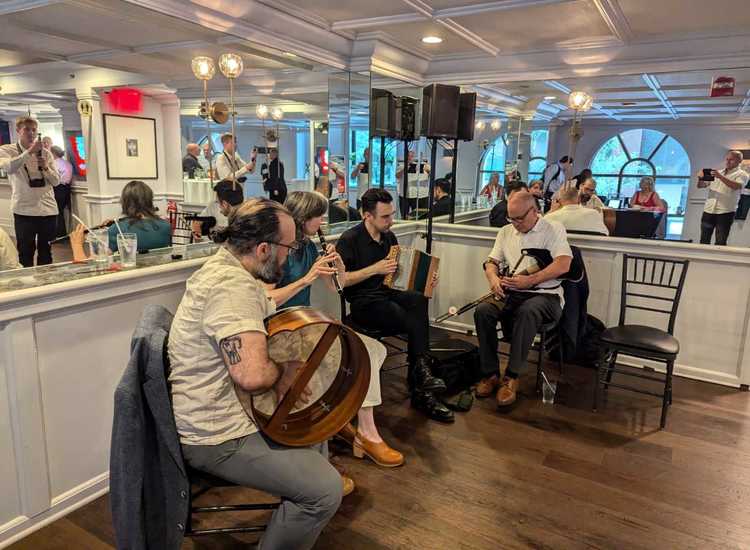[caption id="attachment_68200" align="aligncenter" width="600" caption="From left: Andrew Garman, Evan Johnson and Danny Mastrogiorgio in "Burning." Photo by Monique Carboni."]
"Seminar" By Theresa Rebeck • With Alan Rickman • Golden Theatre, NYC • Open-ended Run
When a writer sets about to write about the act of writing, trouble usually follows. One of the extremely rare exceptions has arrived on Broadway in the form of Theresa Rebeck's sly comedy, "Seminar," with Alan Rickman giving one of the strongest, most secure performances of his long and illustrious career.
Put simply, the gifted Rebeck has given the actor a role in which he's brilliantly, flawlessly cast. He is Leonard, a published but corrupt writer whose career at present consists of enrolling wannabe scribes who are willing and able to cough up $5,000 to be part of an exclusive group of four or so students making up a semi-private class.
In the case of "Seminar," playwright Rebeck has limited Leonard's class to four students, two male and two female, all young, eager, and willing to endure the insults which seem to be their self-loathing teacher's manner of dealing with a world which has long since rejected him as a plagiarist.
Rebeck's source in conceiving Leonard may be an actual writer all-too-well known to other writers, an individual who advertises himself as someone claiming to be able to teach virtually anyone, amateur or otherwise, to write salable screenplays for a substantial fee.
The fee, of course, is payable in advance, and not normally refundable. That's the procedure Rebeck has set up for Leonard's class, pushing the "Seminar" envelope to the extreme point that the teacher she has created doesn't even bother to read what his students give him beyond the first page, or even, depending on his mood, beyond the first paragraph or so.
Rebeck takes dangerous risks in the area of credibility, but her writing is so solid, and her intentions are so secure that the fabric never tears.
Rickman takes his share of risks, too, but his skill keeps him on solid ground, even though it might seem easy enough, in the hands of a lesser actor, to detest the cruelly sarcastic Leonard, at least until his professional life's "secret" is revealed.
Leonard's class takes place in the spacious Upper West Side apartment occupied by one of his students, Kate, whose parents are conveniently out of town -- at least for the time period scheduled to be covered by the classes.
Kate is played by Lily Rabe in great form, reminding her audience that the strong Portia she delivered in last season's "The Merchant of Venice" was no fluke.
Here she works spectacurately well paired by Hamish Linklater as Martin, seemingly the most serious, and very likely the most talented, of the four students.
The remaining young cast members, playing somewhat smaller roles, are Jerry O'Çonnell and Hettienne Park, both of them intelligent and credible as, respectively, Douglas and Izzy.
Playwright Rebeck's bright, funny, knowing script has been well and briskly handled, start to finish, by director Sam Gold.
The author, whose excellent "Mauritius" was a distinct highlight two seasons back, has done plenty of good work in the past, but "Seminar" seems so completely realized that it probably ranks as her strongest achievement to daRte.
Theresa Rebeck's grasp of her materials in "Seminar" is so convincing that it's doubtful that very many members of her audience are likely to waste much time wondering where the students got the five grand Leonard demanded as entrance fee for his classes.
• • •
"Burning" By Thomas Bradshaw • Acorn Theatre • Thru December 17, 2011
It would be difficult indeed to remember the last time a white playwright undertook to write a play centering around black characters.
Thomas Bradshaw, however, a young but fairly experienced black dramatist, has come up with "Burning," a sometimes compelling, sometimes tedious work only three of whose more than fifteen characters are black.
As it happens, "Burning" marks the playwright's Off-Broadway debut, although he won a Guggenheim Fellowship in 2009, and is described in the play's publicity materials as a "downtown phenomenon."
In addition, he has been named one of Time Out New York's "Ten Playwrights to Watch" and identified by the Village Voice as one year's "Best Provocative Playwright."
Bradshaw's earlier plays, of which there are several, have mainly been seen at the State Theater of Bielefield, Germany, and at the National Theatre of Mannheim, also in Germany.
In "Burning," he has created complicated, intersecting stories spanning two eras, although not always clearly or consistently.
In the latter portion of the play, which is contemporary, Stephen Tyrone Williams -- in a fine performance as Peter, one of the play's three black characters -- is a painter who goes to Germany for the opening of a show of his work. He has gone to great lengths not to reveal his race, refusing to be photographed or even interviewed, let alone meeting the show's curators face to face.
In Germany, he encounters a clutch of neo-Nazis, whom Bradshaw appears to have had considerable difficulty integrating into the play except for one rather casual sexual encounter.
Sexual encounters, casual and otherwise, seem almost to constitute the bulk of the play, which might have worked more gracefully had Bradshaw devoted himself more rigorously to his plotlines.
"Burning" which runs at the Acorn Theatre through December 17, has been directed by Scott Elliott, Artistic Director of the New Group, the production's producers.
The long and rambling play runs just a few minutes short of three hours. On one Friday night performance early in the Theatre Row run, there were a number of walkouts at the end of the lengthy first act, an occurrance which, one hears, is not at all unusual with "stagings of Bradshaw's work.
Whether the numerous departures can be chalked up to the play's length, its rather random pace, or even the frequent sex, would be hard to say, but it definitely seemed that the audience was never very firmly locked into the play as it progressed.
The tale's chronologically earliest segment deals with a 14-year-old boy, Chris, who, following his mother's death due to a drug overose, comes to New York hoping to become an actor, and meets a pair of gay men, Jack and Simon, who give him a home, provided he'll do some work around the apartment.
As Chris' hosts, Andrew Garman (who plays Jack) and Danny Mastrogiorgio (who plays Simon) are excellent. Evan Johnson plays Chris as a teenager and is gracefully replaced by Hunter Foster as the character ages into adulthood.
The rambling nature of Bradshaw's construction, added to Elliott' somewhat loose direction, tends to blur the effectiveness and lessen the impact of some of the minor characters.
Nevertheless, Thomas Brashaw is definitely, as Time Out New York pointed out, a playwright to watch, even if he alienates segments of his audiences.









